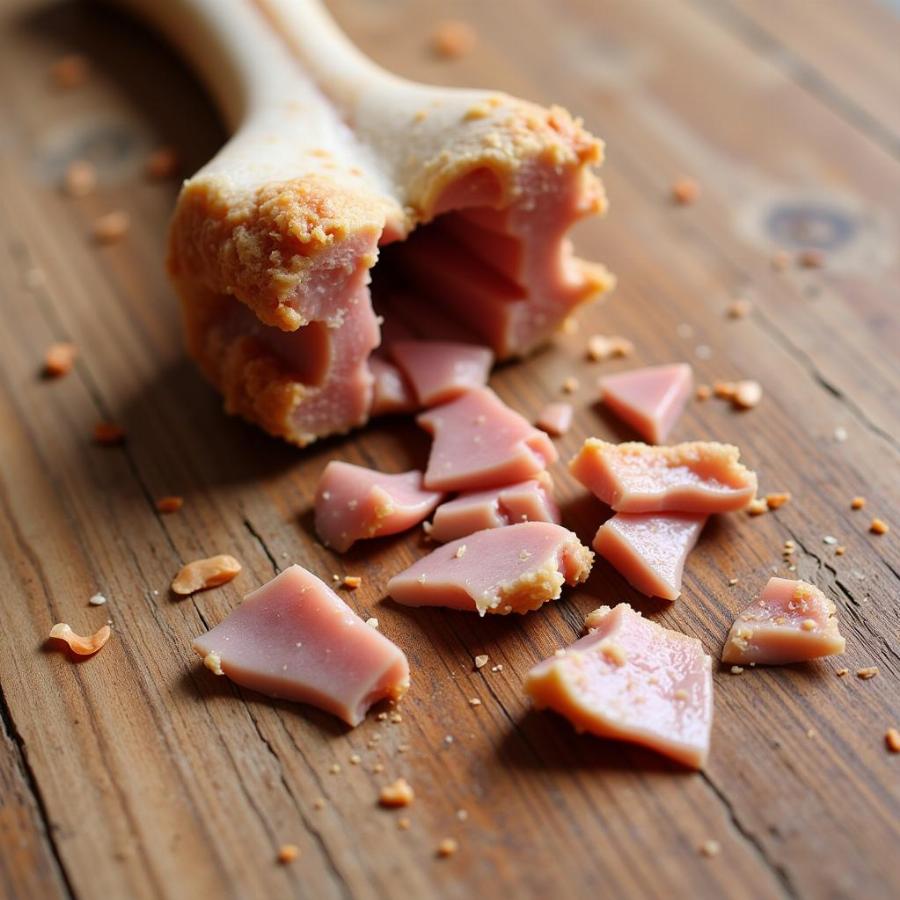Pork bones are a tempting treat for many dogs, but before you toss your furry friend a leftover rib, it’s crucial to understand the potential dangers involved. While dogs can digest some bones, pork bones, especially cooked ones, present significant risks that every dog owner should be aware of. This article will explore the potential hazards of dogs eating pork bones and offer safer alternatives to satisfy your dog’s chewing instincts.
The Dangers of Pork Bones for Dogs
While the image of a dog happily gnawing on a bone might seem natural, pork bones are particularly hazardous for several reasons. Cooked pork bones become brittle and can easily splinter, causing serious damage to your dog’s digestive system. These sharp fragments can lead to choking, punctures in the esophagus or stomach, and blockages in the intestines.
Raw pork bones, while less likely to splinter than cooked ones, carry the risk of bacterial contamination, such as Salmonella and E. coli. These bacteria can cause severe illness in both dogs and humans. Furthermore, pork, whether raw or cooked, is often high in fat, which can contribute to pancreatitis, a painful and potentially life-threatening inflammation of the pancreas.
Cooked Pork Bones: A Definite No-No
Cooked pork bones are unequivocally dangerous for dogs. The cooking process weakens the bones, making them prone to splintering into sharp shards. These splinters can cause a variety of problems, from minor mouth injuries to life-threatening internal damage.
Why Cooked Pork Bones are Especially Dangerous
The high heat of cooking transforms the structure of pork bones, making them brittle and easily breakable. Imagine biting into a dry pretzel stick – it snaps cleanly, creating sharp edges. Cooked pork bones behave similarly, posing a significant choking hazard. Even if swallowed, these fragments can cause internal lacerations and blockages.
 Xương lợn chín gây hại
Xương lợn chín gây hại
Raw Pork Bones: Still a Risk
While some proponents argue that raw bones are safer, they still pose risks. Bacterial contamination is a primary concern, with raw pork bones potentially harboring harmful pathogens. Even if your dog’s stomach acid can kill some bacteria, there’s still a chance of infection, especially for dogs with weakened immune systems.
Bacterial Contamination and Other Concerns
Raw pork bones can harbor bacteria like Salmonella and E. coli, which can cause gastrointestinal illness in dogs. Symptoms can include vomiting, diarrhea, and lethargy. Moreover, raw pork is often fatty, which, as mentioned earlier, can contribute to pancreatitis.
Safe Alternatives to Pork Bones for Dogs
Fortunately, there are plenty of safe and enjoyable alternatives to satisfy your dog’s natural chewing instincts. Instead of pork bones, consider offering:
- Dental chews: Specifically designed to promote dental health, these chews come in various shapes, sizes, and flavors.
- Rubber toys: Durable rubber toys are excellent for chewing and can help clean your dog’s teeth.
- Nylabones: These nylon chew toys are designed for aggressive chewers and come in different strengths.
What to Do If Your Dog Eats a Pork Bone
If your dog manages to snag a pork bone, monitor them closely for any signs of distress, such as vomiting, diarrhea, difficulty breathing, or changes in behavior. If you notice any of these symptoms, contact your veterinarian immediately.
Conclusion
While the allure of a pork bone might be strong for your furry friend, the risks significantly outweigh any potential benefits. Prioritizing your dog’s health means opting for safer alternatives that satisfy their chewing needs without jeopardizing their well-being. Remember, a healthy dog is a happy dog.
FAQ
- Can dogs eat any type of bone? No, some bones are more dangerous than others. Cooked bones, especially poultry and pork bones, are particularly risky.
- What are the signs of a blockage caused by a bone? Signs of a blockage include vomiting, diarrhea, loss of appetite, lethargy, and abdominal pain.
- Are there any bones that are safe for dogs? Raw, meaty bones from large animals like beef or bison can be given under supervision, but always consult your vet first.
- What should I do if my dog swallows a pork bone? Contact your veterinarian immediately.
- Are there any good chew toy alternatives to bones? Yes, there are numerous safe chew toys available, including dental chews, rubber toys, and Nylabones.
- Is pork fat bad for dogs? Yes, pork fat is high in saturated fat and can contribute to pancreatitis in dogs.
- Can small dogs eat pork bones? No, pork bones are dangerous for dogs of all sizes.
Beaut Dogs is your go-to resource for all things related to dog care. We offer comprehensive information on dog breeds, health, nutrition, and training. For personalized guidance and answers to your specific questions, contact us at Email: [email protected]. Beaut Dogs is dedicated to helping you provide the best possible care for your beloved canine companion.